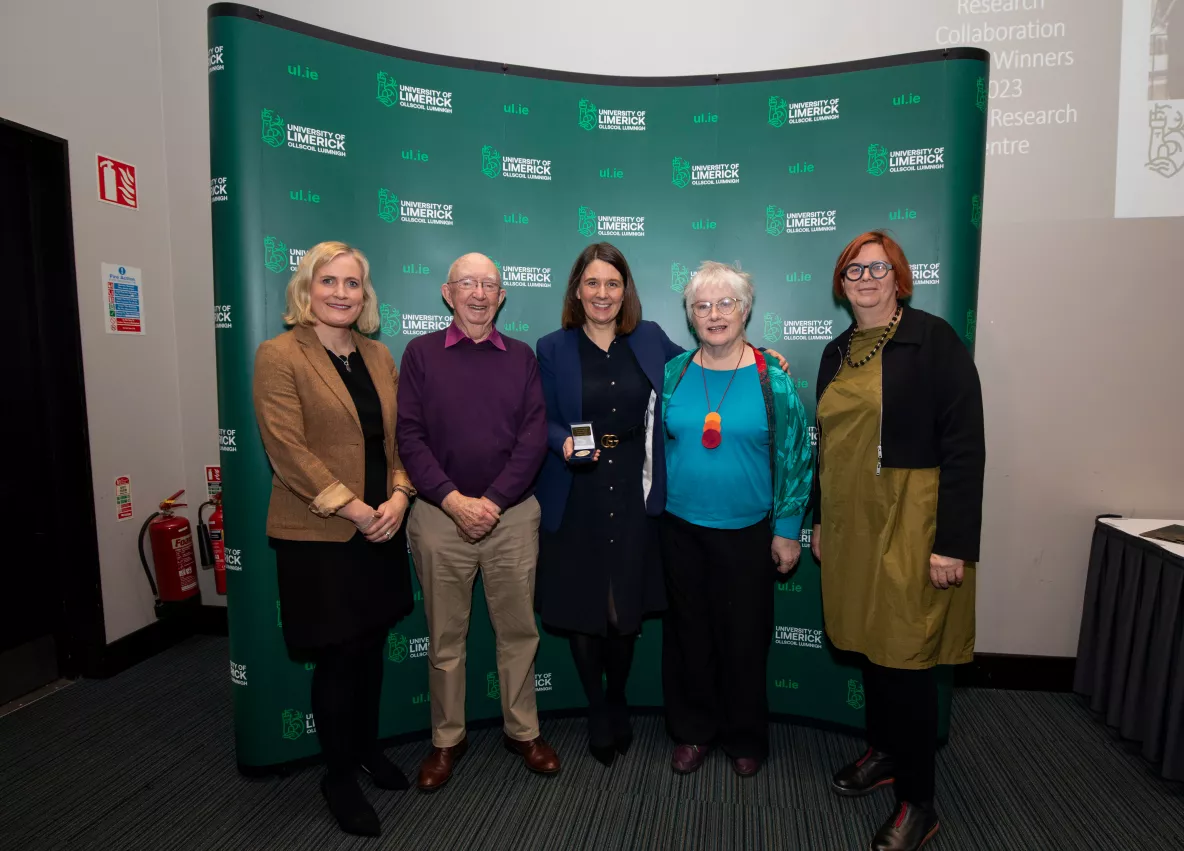
A research centre at University of Limerick has been recognised for its work on improving health services for older adults.
The Ageing Research Centre (ARC) at University of Limerick has been recognised at the UL President’s Research Excellence and Impact Awards for its leadership in championing interdisciplinary research focused on supporting older adults and family caregivers.
UL President Kerstin Mey presented the Outstanding Research Collaboration Award to Professor Rose Galvin, Professor in Physiotherapy and Professor Kate Robinson, Professor of Occupational Therapy in the School of Allied Health, who are Co-Directors of the Ageing Research Centre, at an awards ceremony hosted on campus.
Professor Mey highlighted the breadth and strength of the collaboration as an exemplar of best practice in tackling grand challenges such as healthcare.
Collaborators on the project include the UL Hospitals Group, Mid-West Community Healthcare, Irish National Ambulance Services, St Vincents Hospital, Connolly Memorial Hospital, Irish Gerontological Society, HRB and others.
“Research from the Ageing Research Centre has been instrumental in driving the adoption and integration of innovative healthcare models for older adults and their family caregivers,” said Professor Mey.
“This research has played a pivotal role in shaping national policies pertaining to health and social care for older adults.”
The President’s Research Excellence and Impact Awards recognise staff at all University levels who have made outstanding contributions in the excellence and impact of their research (beyond academia).
One of the studies undertaken as part of the ARC collaboration is OPTIMEND, which introduced a dedicated team of health and social care professionals (HSCP) into an emergency department (ED) to focus on timely assessment and intervention among people aged >65 years.
Older adults represent up to 25% of all ED users and experience longer ED stays and demonstrate higher rates of poorer outcomes following emergency care such as unscheduled return to ED, emergency of unplanned hospitalisation.
Professor Galvin explained the significance of the study, the success of which catalysed the establishment of teams on a nationwide scale, changing how older adults receive care in emergency departments.
“The OPTIMEND study was the first trial of its kind in the world. The evidence from this trial demonstrated the impact an interdisciplinary team of health and social care professionals operating within an emergency department can have on the outcomes and experiences of older adults,” said Professor Galvin.
These efforts yielded tangible improvements in outcomes of importance to older adults, research findings that have played a pivotal role in shaping national policies pertaining to health and social care for older adults. This work has changed services to ensure they dovetail with the distinctive requirements and preferences of older adults and family caregivers.
Key findings from the study demonstrated that older adults can be safely discharged from the ED following early assessment and intervention by a health and social care protection team, in collaboration with ED medical and nursing staff.
The study also showed that older people who were assessed by the HSCP team spent significantly less time in the ED than those who did not receive HSCP care.
Professor Robinson addressed the long-term impact of the research.
“The OPTIMEND study developed the standard of care for older adults in EDs in Ireland and this model has been rolled out nationally. We are very proud of the impact our work has had on the lives of older adults and their caregivers.
“We noticed that while we halved the length of ED stay and significantly reduced the incidence of admission to hospital among the group who received the HSCP intervention, the incidence of ED return within 30 days was similar in both groups. We delved into this in more detail and found that the transition from the ED to the community was fragmented,” Professor Robinson added.
Kate Morris, Head of Campus Engage, Irish Universities Association (IUA) and external reviewer for the Outstanding Collaboration Award said: “Professor Robinson and Professor Galvin have established a band of researchers, clinicians, older people, carers, policy makers, all working together to ensure older people experience excellent care across emergency departments and community settings.
“Their work is a stellar example, that when we involve those most affected in the research process, we achieve the greatest outcomes – saving health care services time and money while delivering highest standards of patient centred-care.”
The award was adjudicated by the Research Impact Committee, chaired by Professor Helena Lenihan, Kemmy Business School.
Speaking at the event, Professor Lenihan said: “The ARC collaboration is an exemplar of excellence and impactful research which is tackling real-world problems in a living lab environment. The impact of this work will benefit generations to come.”
Discover more about the UL President’s Research Excellence and Impact Awards.
LISTEN: You can listen to a podcast involving members of the Ageing Research Centre team along with contributions from some of the patient participants in the programme by clicking on the link below.